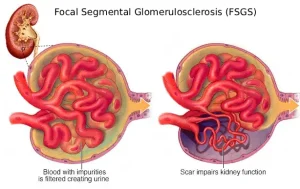Overview
Diagnosis
To diagnose focal segmental glomerulosclerosis (FSGS), a healthcare professional reviews your medical history and performs several tests to evaluate kidney function.
Testing may include:
-
Urine tests: A 24-hour urine collection measures the amount of protein and other substances in the urine to check for kidney damage.
-
Blood tests: A test called glomerular filtration rate (GFR) determines how well the kidneys filter waste from the blood.
-
Kidney imaging: Imaging tests such as ultrasound, CT, or MRI scans show the shape and size of the kidneys. In some cases, nuclear medicine studies are used for more detailed evaluation.
-
Kidney biopsy: A small tissue sample is taken from the kidney using a needle to confirm the diagnosis of FSGS under a microscope.
Treatment
Treatment for focal segmental glomerulosclerosis depends on the underlying cause and severity of the condition. The goal of treatment is to control symptoms, slow disease progression, and protect kidney function.
Medications
Depending on the type and cause of FSGS, medicines that may be prescribed include:
-
Angiotensin-converting enzyme (ACE) inhibitors or angiotensin II receptor blockers (ARBs) to lower blood pressure and reduce protein in the urine.
-
Cholesterol-lowering medicines, as people with FSGS often have high cholesterol.
-
Diuretics to help the body remove excess salt and water, which can lower blood pressure and reduce swelling.
-
Immune-suppressing medicines, such as corticosteroids, to stop the immune system from attacking the kidneys in cases of primary FSGS. These are used cautiously due to potential side effects.
Because FSGS can recur and the kidney scarring may be permanent, regular follow-up with a healthcare provider is essential to monitor kidney function.
For individuals who develop kidney failure, advanced treatment options include dialysis or a kidney transplant.
Advertisement

